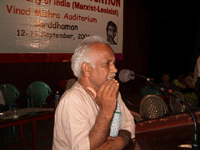
Party-building is all about construction and creation – an unending saga of class struggle and social transformation
(excerpts from remarks made by Comrade Dipankar Bhattacharya at the end of the two-day all India cadre convention at Bardhaman)
W hen the idea of this cadre convention was first mooted, it perhaps did not appear all that necessary. Some comrades have perhaps found it a bit too unusual for the CC to convene two major cadre conventions between two Congresses. In July 2004 we had met at Bhubaneshwar in the wake of the NDA's ouster from power and on the occasion of the thirtieth anniversary of the reorganisation of our Party. Indeed this convention has been quite an extraordinary assembly in our Party history with nearly 500 leading comrades, more than half of them secretaries of various Party committees, spending two full days discussing about Party membership, Party branches and circulation of Party organs. This is something we could not possibly have done in a Party Congress where political and ideological questions and reviews of movements and activities dominate the proceedings. And having participated so energetically in this extraordinary convention, I am sure all of you would agree that this has indeed been a highly necessary exercise for our entire Party. We have had a very frank and ruthless discussion regarding the state of our Party organisation, and yet the convention has also revealed the tremendous potential and strength that we possess.
To take just one example, this convention has revealed that between July and August we have recruited more than 11,000 candidate members, nearly 4,000 among them being women. Not that all our Party committees made a major recruitment drive, in many cases serious efforts are yet to begin. Moreover from August 6 to 18 all of us were busy with the Janadhikar Abhiyan. Yet 11,000 is certainly not a small number. If we can maintain the tempo and if our entire Party organisation can get fully involved we can surely cross the 1,00,000 mark before the Eighth Congress.
This is true not only in terms of the overall target of membership, but also in terms of the specific minimum targets that we have set for ourselves – 20,000 women, 10,000 organised/unionised workers and 5,000 student-youth members. Some comrade has suggested that we should recruit 20,000 women members within this year so that we can hold the Eighth Congress with 20,000 full members from among women. We should surely give it a good try. Equal attention should also be paid to the question of organising women members in Party branches. One district committee has put forward the idea of organising separate branches comprising only women members. In the process they hope to secure greater participation of women and development of more and more activists and branch secretaries from among women comrades. This can be done on an experimental basis in a few select cases, but we must remember that the idea is to ensure greater participation of women in the affairs of the Party as a whole, make them equal participants side by side with men. 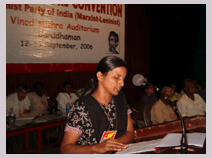
With increasing induction and participation of women, there will surely be greater discussion and debate around issues pertaining to the role of both men and women and we must not shy away from such debates. We must know how to carry forward such debates while carrying on with the work and utilise such debates for deepening our Marxist understanding and outlook on this whole question.
The women's question, it must be understood, is much more fundamental and strategic in nature than many other questions we are currently dealing with. The whole question of castes and social oppression, for example, should get resolved in the course of the democratic revolution itself. We will still have classes, but hopefully not castes as instruments of oppression or units of mobilisation. The women's question stands in a different category. It arose with the rise of patriarchy and patriarchy arose with the rise of class society and will completely go away only with the advent of communism, with the withering away of classes and abolition of exploitation of man by man, human by human if you will. The elimination of feudalism and development of capitalism even with socialist components under a people's democratic order will only reveal more and more dimensions of this question and Marxism will continue to resolve them in its characteristic revolutionary way. Marxism has developed as the ruthless criticism of all that exists, all that is rotten and distorted, and most importantly, as criticism that does not shy away from its own consequences.
This convention has also laid a lot of stress on increasing the number and role of working class comrades in the Party. A Communist Party is the highest political organisation of the modern proletariat, and this class of modern proletariat develops around the core of the industrial working class. In our case, the rural proletariat is much more numerous than the urban, industrial proletariat, but it is impossible to build a revolutionary communist party without a serious involvement of working class vanguards. Ever since the reorganisation of our Party in 1974, working class vanguards have indeed played a key role in the affairs of our Party. Places like Durgapur , Dhanbad, Bokaro, Jamshedpur and Chennai have been major names in our Party history – they have given us many leading and even full-time Party cadres and done everything possible to sustain the Party apparatus and ensuring uninterrupted publication of Party organs and Party literature in most difficult and trying circumstances all through the 1970s and 1980s. 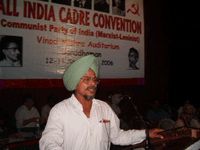
Of late we have however seen a disturbing decline in the role and participation of working class comrades in many places. The intensified assaults by big capital, domestic or foreign, on the living and working conditions and trade union rights of the working class have of course been an undeniable reality since the 1990s. The ideological-political environment has also turned a little adverse – influenced internationally by the collapse of the Soviet Union and heightened offensive of imperialist globalisation and domestically by the rise of the Mandal-Kamandal factors, political polarisation around social justice and communal nationalism. But it will be an unpardonable mistake on our part if we are not able to see the emerging and growing signs of change – growing strength and struggles of contract and casual workers, heightened resentment of the people against growing economic insecurity and loss of livelihood, the political unrest brewing in the countryside in answer to the ravages of agrarian crisis. The Party must assist working class comrades to overcome all inertia and alienation, passivity and pessimism and rediscover their revolutionary moorings and crucial role in running and strengthening their own party. 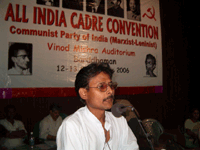
This convention has brought to the fore our multifarious experience in terms of building the Party organisation. There is no fixed pattern, no rigid theory of stages. Somewhere we have started with political intervention and initiative from above and gone on to unleash local struggles, in many other areas we have imparted a political thrust to struggles that have already been underway. Somewhere we have started from the middle class, with individual political contacts, and gone on to establish stable political contact with the rural poor and basic classes; somewhere we are trying to establish contact with the middle classes on the basis of our powerful base among the rural poor. But it is clear that over a period of time every strong local Party organisation must develop all the four key components – (i) we must unleash powerful class and mass struggles challenging the hegemony of the dominant social and political forces; (ii) we must have a system of regular political initiative, propaganda and agitation; (iii) we must do systematic ideological work among the advanced forces attracted and activated by the struggles and our political propaganda, and (iv) we must have a comprehensive and consolidated organisational system to run the growing activities and affairs of the Party. 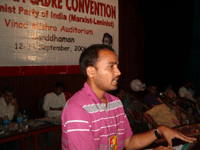
We have been discussing Party-building. It has two aspects: Party and building. Building an act of creation and construction. Without a constructive, comprehensive and creative approach we cannot build anything of significance. So we must give up all ideas that tend to belittle or trivialise the crucial importance of this essential aspect of Party-building. And we must cherish all the qualities that are essential to build something – discipline, determination, patience, hard work, perseverance, courage, sacrifice, hope and vision. If we emphasise revolutionary optimism and determination, it is only because nothing can be built on the basis of pessimism and frustration.
The other aspect that has to be grasped is the Party that we are building – a revolutionary Communist Party that has a long way to go, for which a successful people's democratic revolution constitutes the minimum programme and the maximum programme goes up to the development of communism. This means that becoming a member of the Party should be seen as a lifelong project or mission, there couldn't be any question of retiring or resigning in the middle of this journey. It also means that we have to visualise and work for the creation of a new social and political order, we must take on everything that is retrograde and rotten, that sustains the present order of oppression and exploitation. In other words, the Party is all about struggle and transformation, but in conducting this struggle we have to be patient and we must follow a constructive and collective approach. We must remember that like socialism, a communist party too cannot be built in an ideal world; it can only be built in concrete conditions, and on the basis of raw materials handed down by history and shaped and supplied by the existing society. We have just begun; there are many more hurdles waiting to be crossed, many more exciting destinations waiting to be discovered and explored. Let us march ahead step by step, shoulder to shoulder.